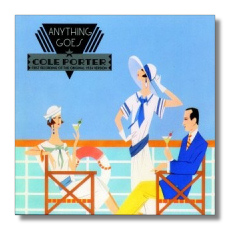
The Internet's Premier Classical Music Source
Related Links
- Latest Reviews
- More Reviews
-
By Composer
-
Collections
DVD & Blu-ray
Books
Concert Reviews
Articles/Interviews
Software
Audio
Search Amazon
Recommended Links
Site News
 CD Review
CD Review
Cole Porter

Anything Goes
1988 London Studio Cast Recording
Kim Criswell, Cris Groenendaal, Frederica von Stade,
Jack Gilford, London Ambrosian Choir
London Symphony Orchestra/John McGlinn
EMI CDC7498482
I've had this idea for a long time: Americans tend to create their most characteristic art when they think they're doing something else. Our dramatic tradition is not the stage as much as the movies. Even there, note that we make movies, rather than "films." That is, John Ford made movies (and Westerns at that), whereas nice boys like the Cohn brothers make films. While Americans have produced great art song in the tradition of Europe, it turns out that the so-called "standards" from the teens through the 40s have a deeper hold not only on the natives' affections, but on much of the rest of the world's as well. I may, for example, admire - or even be moved by - Barber's "Sure on this shining night," but I make some sort of effort to bring it to consciousness. On the other hand, I find myself humming "Our Love Is Here to Stay" or "Don't Get Around Much Anymore."
Can we even call this "tradition?" None of the music is very old, after all, and we tend to regard it, while the paint is still spanking new, as disposable. Producers, composers, lyricists, and "book" writers for decades looked on the Broadway show (even with such examples as Show Boat, the Of Thee I Sing trilogy, Lady in the Dark, and Anything Goes) as the product of a season. The real money was to be made in sheet music, recordings, air play, and new arrangements. Ira Gershwin, during the very successful run of the Girl-Crazy -based Crazy for You, was amazed that "people were still interested in those old songs." To have preserved a show in its original state would have struck practically all of them as a bizarre idea. When Gershwin wrote for posterity, he came up with the Concerto in F, not Lady, Be Good. Consequently, the original versions disappeared - perhaps, in some cases, irrevocably.
Theater historians have long considered Porter's Anything Goes the quintessential 30s musical. It contains the following evergreens: "I Get a Kick Out of You," "All Through the Night," "You're the Top," "Anything Goes," and "Blow, Gabriel, Blow" - all showing Porter at his very best. Yet most know the show, if at all, through the Bing Crosby movie (1956), which jettisoned a great "book" by Lindsay and Crouse, dropped several numbers, and may have interpolated (I'm not sure of this) songs not by Cole Porter. In the 70s and 80s, however, historians began to search the archives and warehouses of music publishers, theatrical producers, and movie studios for primary materials. This may have begun well past the eleventh hour, but they have found a slew of stuff by Gershwin, Porter, Rodgers, Kern, and Berlin, among others. Anything Goes was one of these finds.
However, full scores did not agree with parts, and orchestrations for certain numbers were missing. John McGlinn, working with Hans Spialek (one of the show's original orchestrators; the other was Robert Russell Bennett), reconstructed the original score to a very great extent. Spialek, who orchestrated many of the major Broadway shows, died before he completed the project - a tremendous blow to further rescue effort, since he seems to have possessed a photographic musical memory. Russell Warner, orchestrator extraordinary, came in to finish.
The result? Well, if I were President, not only would I get fabulous babes, but I'd also make buying this CD a requirement for a high-school diploma. If nothing else, Porter's lyrics tell you about current events of the 30s. An impressive job all the way around.
McGlinn makes the orchestra sparkle and dance. Kim Criswell, as Reno Sweeney, belts out the Ethel Merman numbers with the Merman verve, but with a sweeter, truer voice. Actually, she overwhelms most of the rest of the cast. Von Stade, as the ingenue, plays a bit of a stick, like a stick. She holds back too much. While such restraint may be admirable in Lieder, it does little for this music, designed to "wow." She's fine in "All Through the Night," almost pure César Franck happily stepping through a fox trot, but she fails in her "breakout" number, "The Gypsy in Me." Jack Gilford for me could do no wrong, as he enjoyed a late career reviving parts played by Victor Moore, the 30s' favorite milquetoast. As Moonface Martin, Public Enemy #13 (who, at show's end, is declared "not wanted, because he is completely harmless"), Gilford provides the CD's comic highlight in "Be Like the Bluebird," a swipe at treacle like "The Bluebird of Happiness" and the proud scion of Gilbert and Sullivan's "Tit-Willow Song." The London Ambrosian Choir manages to speak, if not pure American, at least mid-Atlantic, so the British accents don't jar my ear.
Even the accompanying booklet's notes - by Miles Kreuger, Howard Lindsay, Robert Kimball, and John McGlinn - are entertaining and informative. Kreuger goes so far as to provide historical annotations to clarify Porter's highly topical lyrics, and I, for one, appreciate it. Among other things, I found out about Mrs. Ned McLean (who lives on in a line from "Anything Goes"). The entire production is first-rate.
Copyright © 1996, Steve Schwartz


















